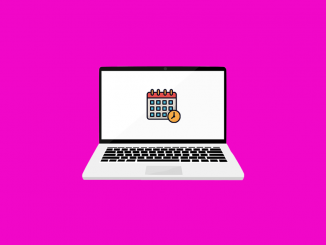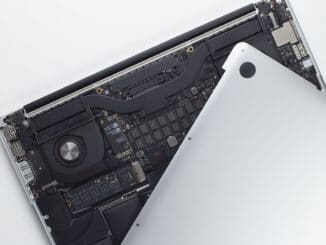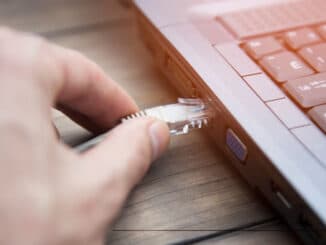When you are using your laptop does it get hot?
When you use any electronic device for a period of time it is going to get hot. A laptop is no different from other electronic devices.
The more that you use your laptop the hotter it’s likely to get. Maybe you’re running some intense tasks or playing a game that is using the full spectrum of your graphics card. Even with light use, a laptop can heat up.
If your laptop runs too hot then you can do some serious damage. Hard drives certainly don’t like being too hot for example. There have been cases where hot laptops have burned out internal components and stopped working altogether. These are expensive problems to fix.
Table of Contents
Why do Laptops Get Hot?
A desktop computer is much less likely to overheat than a laptop. The reason for this is that desktop computer boxes are much larger than laptops, and the air circulation is greater so cooling happens more naturally.
Modern laptops have all of their components crammed in really tight to make them small and compact. It’s really tough for the heat to dissipate under these conditions and as a result, it doesn’t take long for a laptop to start warming up.
Over the years laptops have used more powerful processors and these create more heat. There have been changes to operating systems such as Windows as well. These changes place more demands on the processor, and it has to work a lot harder which means the generation of more heat.
Yes, there are fans and heat sinks inside laptops to reduce this heat problem. There will be air vents as well to assist with natural airflow. But in a lot of cases, these measures are not enough to prevent your laptop from getting too hot.
Occasionally fans in laptops can go wrong and this makes the problem even worse. There is not much that you can do about this but there are other actions that you can take to keep your laptop a lot cooler.
Is Everything Working Properly?
It doesn’t matter what make or model of laptop you have, or how old it is, things can go wrong. I ‘ve owned several laptops and I bought a brand new one once that ran hot straight out of the box.
After returning it the supplier told me that a fan was not working properly which was the cause of the overheating. They replaced the fan and everything was good. So don’t take it for granted that everything is working properly.
You need to take good care of your laptop. If you carry yours around from one place to another avoid bouncing it off of walls and other hard surfaces when it is in your laptop bag. A sudden jolt can render a fan inoperable and your overheating problems will begin.
If you suspect that your laptop is overheating and it becomes really hot to the touch then you can check a few things out for yourself. I’d not advise opening the case of your laptop if it’s still under warranty or if you don’t know what you’re doing.
You can check if your fans are functioning correctly by using special software designed to diagnose problems. A lot of laptop manufacturers have their own software for this and you can visit their website and download it if it is available. If your laptop manufacturer doesn’t have this software then there are some good third party solutions available.
The air vents in your laptop are vital for cooling so check to see if they need cleaning. After a short period of time debris and dust can build up and partially block air vents which disrupt natural airflow.
Be careful when you are cleaning the air vents. The best way to clean them is through the use of compressed air. Most office supply vendors have compressed air products available. You can just blow into the air vents but this may only partially clear a blockage. Using a damp (not wet) cloth on the air vents can also work.
All laptops have BIOS settings. To access these settings you’ll need to use a keyboard function key such as F2 or F10 as soon as your laptop is booting up (check with the manufacturer for the right function key to use).
Modern BIOS settings include details of how hot a laptop is running and at what temperature the fans will start to work to cool everything down. If a manufacturer has had problems with overheating there may be a new version of the BIOS that you need to install. This can be tricky so get help if you need it.
Good Laptop Habits to keep it Cool
This is more a list of don’ts when it comes to laptop use:
- Don’t use your laptop on your lap for too long – your body heat will cause it to get warmer
- Keep your laptop away from direct sunlight – if you want to use it outside on a warm day then find some shade
- Don’t use your laptop near heat sources such as radiators and heat vents
- When you are not using your laptop turn it off – give it a well-earned rest and a chance to cool down
You need to use common sense to keep your laptop cool. Any situation which means you’ll expose your laptop to additional heat needs avoiding.
Other Ways to Keep Your Laptop Cool
There are some accessories that you can purchase for your laptop to help keep it cool. One of these is a laptop stand that helps to provide more airflow to dissipate the heat. This works by creating more distance between the bottom of your laptop and the surface you are using it on.
There are aluminum laptop stands available which are worth investing in because the aluminum becomes a heat sink and will draw heat away from your computer. This will help to cool down your laptop even more.
You can also purchase a laptop cooling pad. There are cooling pads available that have built-in fans which kick in when things start to get too hot. Some laptop pads do not have fans but have large air vents to provide additional airflow.
Take Steps to Keep Your Laptop Cool
You probably love your laptop just as much as I love mine. Can you imagine being without it for a while because it overheated and damaged some internal components? It doesn’t bear thinking about, does it? And then there is the expensive repair bill – ouch!
Look after your laptop. Don’t bounce it around all over the place and check the air vents regularly for blockages. Use your laptop in a cool environment to minimize the chances of it overheating. Remember that a laptop stand or cooling pad can seriously cool down your laptop so think about investing in one of them.




Be the first to comment